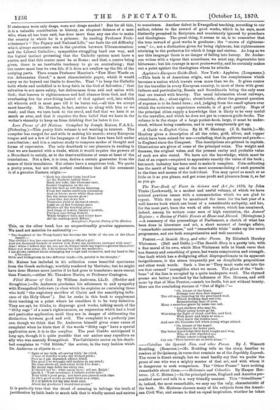Filial Honour of God. By William Anderson, LL.D. (Hodder and
Stoughton.)—Dr. Anderson proclaims his adherence to and sympathy with Evangelical believers (a class which he explains as containing those who hold "the expiatory sacrifice of Christ and the sanctifying influ- ence of the Holy Ghost"). But he seeks in this book to supplement their teaching on a point where he considers it to be very defective. They are apt, be thinks, to disparage good works, talking much of the "filthy rags" of a man's righteousness, an expression which had a local and particular application, until they are in danger of obliterating the distinction between good and evil. The complaint is a perfectly just one, though we think that Dr. Anderson himself gives some cause of complaint when he hints that if the words "filthy rags" have a special application now, it is to the surplice. The poet Crabbe anticipated it long ago, though it is quite possible that our author may repudiate an ally who was scarcely Evangelical. The Calvinistic rector on his death- bed complains to "Old Dibble," the sexton, in the very fashion which Dr. Anderson so objects to :—
Spite of my faith, all-saving faith,' he cried, fear of worldly works the wicked pride; Poor as I am, degraded, abject, blind,
The good Fve wrought still rankles in my mind;
My alms-deeds all, and every work I've done ; My moral rags defile me every one. It should not be: what say'st thou! tell me, Ralph.' Quoth I, !Your reverence, I believe you're safe;
Your faith's your prop; nor have you passed such time In life's good works as swell them to a crime.
If I of pardon for my sins were sure,
About my goodness I would rest secure."
It is perfectly true that the dread of seeming to infringe the truth of justification by faith leads to much talk that is wholly unreal and untrue
to conscience. Another defect in Evangelical teaching, according to our author, relates to the reward of good works, which is, he says, most distinctly promised in Scripture, and consistently ignored by preachers and theologians. The great thing, it seems to II; 18 to remember that the true reward of good works is goodness ; the "crown of righteous- ness," i.e., not a distinction given for being righteous, but righteousness attaining to the perfection for which it longs and strives. As long as we use this language there is no danger of falling into heresy. Dr. Ander- son writes with a vigour that sometimes, we must say, degenerates into- bitterness ; but his courage is most praiseworthy, and he certainly makes out a point against the theologians whom he attacks.






























 Previous page
Previous page